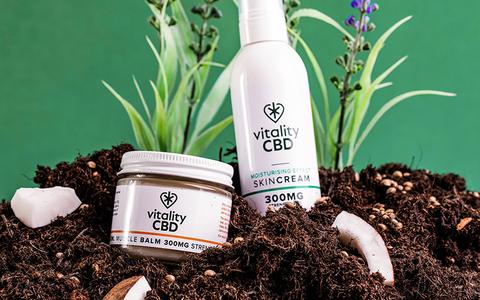But there’s one aspect of your CBD oil you might not have considered—the oil itself. Though it’s easy to assume the oily tincture is just a resinous byproduct of harvesting CBD, in fact it’s an added carrier designed to facilitate CBD consumption, important when considering buying CBD.
Why do we need CBD carrier oils?
Following the extraction process, the resultant product will fall somewhere between pure CBD and a broad spectrum extract. The former is a white, powdered substance, whilst the latter is a mix of darker green and brown tones, indicative of its utilisation of more compounds from the hemp plant.
In both instances, this resultant product still needs to be diluted by a carrier oil for three reasons.
- Ease of dosage: In the process of extraction, the concentration of CBD becomes very high. Since being able to alter dosage between people is so important, by diluting the extract it’s much easier to measure your daily dose.
- Bioavailability: CBD is best absorbed after binding with fat molecules that your body finds it easier to break down. Carrier oils increase the bioavailability of the hemp compounds i.e. the amount your body can process.
- Ease of intake: Put simply, ingesting purified CBD powder isn’t the most pleasant experience. By using a carrier oil and adding flavourings, the whole process becomes much more pleasant.
Which CBD carrier oil is best?
Knowing why we need carrier oils is half the battle when choosing the best CBD, but figuring out which one is best can be tricky. We’ve taken a wide angle view of all the CBD carriers on the market currently, and broken down their qualities and drawbacks.

Coconut oil
One of two so-called MCT (medium chain triglycerides—you can see why it’s abbreviated) oils on this list, coconut oil is our top pick of the carrier oils available on the market.
When preparing coconut oil for use with CBD, it goes through a process called fractionating, whereby the larger fat molecules are removed, leaving just the MCTs. The reason MCT oils are so popular is because MCTs are more easily absorbed than their long chain triglyceride cousins, like the ones found in olive oil.
Coconut oil has several other benefits, including its ability to mask the strong earthy flavour of full extract CBD, and its thin consistency, which makes it easier to proportion and dose. Though other oils have their own unique benefits, coconut oil is a strong, reliable choice.
Our belief in MCT is why we use coconut oil in our CBD Oral Spray.
Hemp seed oil
Hemp seed oil is often seen as synonymous with CBD oils but that’s actually a common mistake. In fact, hemp seed oil contains no CBD, though it is comprised of other key compounds from the hemp plant.
Olive oil
If you have any friends from the Mediterranean, you’ve probably heard scores about the health benefits of olive oil. Use it in your cooking, splash it on your salad, guzzle it by the quart—it’s supposedly all good.
However, since olive oil contains a high number of large monounsaturated fats, the body takes more time to process it than with MCT. Even though olive oil has been noted for its antioxidants, its viscous quality can make it difficult to dose, and its slower absorption rate makes it less efficient for using with CBD, though it’s still a solid and often used option.

Palm oil
Much like coconut oil, palm oil can be fractionated to form MCT oil, and though it functions in practically the same way, there are wider problems at play. At Vitality CBD our main concern is maintaining natural synergy, and the production of palm oil works directly counter to that.
The core issue is deforestation. In order to keep up with the high demand of palm oil, acres of rainforest are being cut down each day, contributing to the loss of animal habitat for vulnerable species. It also further exacerbates climate change since the mechanical process both releases masses of CO2, and limits the valuable role palm trees play in processing the harmful build up of greenhouse gases.
Learn more about CBD oils
Vitality CBD’s product range has been guided by our own research and development into carrier oils, and their unique synergies with the hemp plant. We believe a well-informed user is a happier user, which is why we've formulated several articles outlining the science behind CBD.
To get a better insight into how cannabinoids interact with the human body, read our piece on the endocannabinoid system, or if you’re looking for a basic introduction to just what CBD is, check our beginner’s guide for CBD.
We also have category pages that cover each of our product ranges, including CBD e-liquids, CBD oils, CBD cosmetics, and CBD edibles!
For any more questions you might have about carrier oils or how best to buy CBD, our experienced team are always on hand to answer any questions and support your curiosity! You can easily reach out to us via our contact page.





















Leave a comment
All comments are moderated before being published.
This site is protected by hCaptcha and the hCaptcha Privacy Policy and Terms of Service apply.